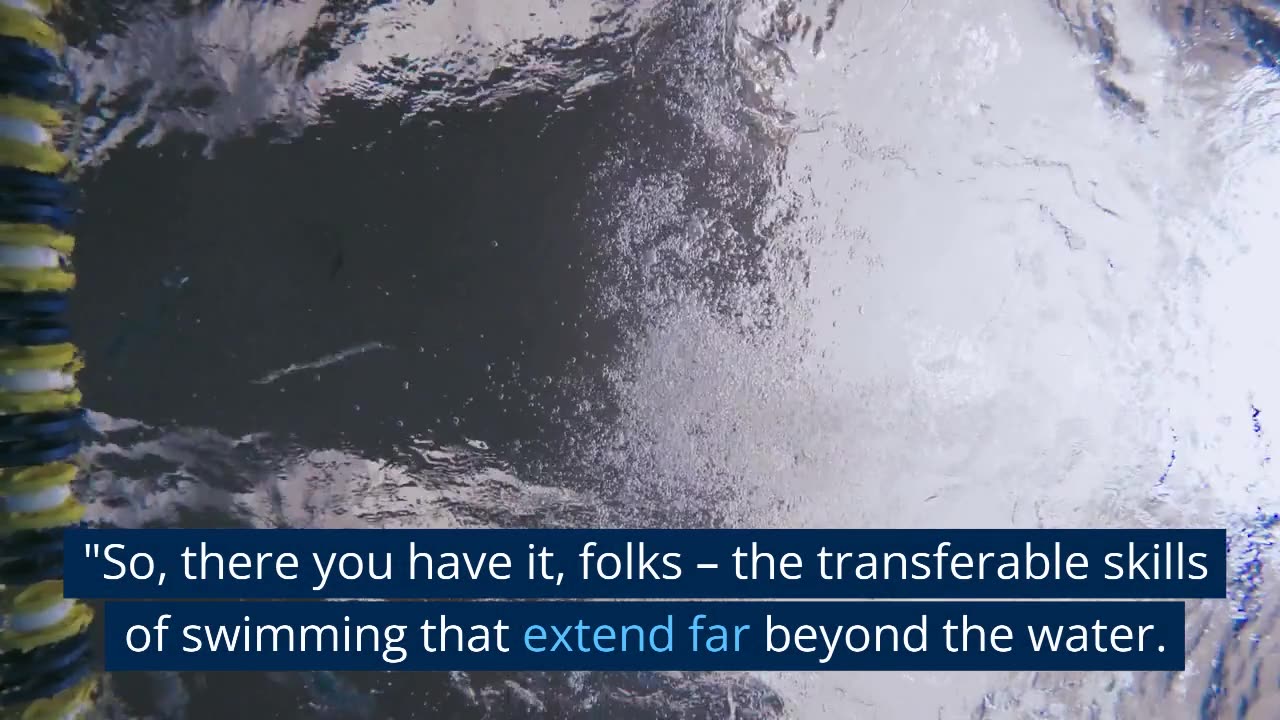Premium Only Content

Transferable Skills of Swiming
Swimming is not only a vital life skill but also a source of transferable skills that extend into various aspects of life and other activities. These skills can be applied across a range of contexts, offering benefits beyond the pool. Here's a description of the transferable skills of swimming:
Physical Fitness and Health
Cardiovascular Endurance: Swimming is an excellent form of cardiovascular exercise, building heart and lung strength. This endurance is beneficial in other sports and physical activities.
Muscle Strength and Flexibility: Swimming engages multiple muscle groups, promoting overall strength and flexibility, which can enhance performance in various sports and reduce the risk of injury.
Coordination and Balance: Swimming requires coordinated movement of the arms, legs, and core, improving overall body coordination and balance.
Discipline and Time Management
Regular Training: Swimmers often adhere to a consistent training schedule, which fosters discipline and time management. This skill is applicable to academic pursuits, work, and other activities requiring commitment.
Goal Setting: Swimmers set personal goals, such as improving times or mastering new techniques. The ability to set and achieve goals is valuable in any endeavor.
Teamwork and Collaboration
Team Dynamics: Although swimming is often considered an individual sport, it also involves relay races and team competitions, teaching teamwork, collaboration, and communication.
Supporting Teammates: Swimmers learn to support and encourage their teammates, developing a sense of camaraderie and cooperation.
Focus and Concentration
Mental Discipline: Swimming requires intense focus, especially during races or when learning new techniques. This mental discipline is useful in academic settings, work environments, and other sports.
Stress Management: The rhythmic nature of swimming can be calming, helping swimmers manage stress and stay composed under pressure.
Leadership and Responsibility
Leadership Roles: Experienced swimmers may take on leadership roles, such as team captain or coach's assistant, fostering leadership skills and a sense of responsibility.
Mentoring and Teaching: Swimmers who teach or mentor others develop communication skills and the ability to explain complex concepts in simple terms.
Problem-Solving and Adaptability
Adapting to Conditions: Swimmers must adapt to different pool environments, water temperatures, and weather conditions. This adaptability is valuable in many situations where flexibility is required.
Problem-Solving: Swimming involves constant adjustment and improvement, whether refining techniques or solving race-related challenges. These problem-solving skills can be applied in various contexts.
Overall, the transferable skills of swimming contribute to personal development, physical fitness, and success in many areas of life. Whether in school, work, or other sports, the discipline, teamwork, focus, and adaptability gained through swimming can be invaluable assets.
-
 31:45
31:45
RepublicanStudy
16 hours agoOne Big Beautiful Exclusive Conversation with Budget Chairman Arrington
3.63K3 -
 8:28
8:28
MattMorseTV
15 hours ago $8.92 earnedThe EU just SURRENDERED to Trump.
38.9K45 -
 2:09:17
2:09:17
Side Scrollers Podcast
20 hours agoKirsche & Leaflit on HIT LIST + Nintendo RUINS Mario Kart + More | Side Scrollers Live
21.2K5 -
 14:17
14:17
GritsGG
1 day agoCopy Our Strategy We Use to Win & Instantly Improve!
23.8K2 -
 6:08:23
6:08:23
The Pascal Show
20 hours ago $4.70 earnedDIDDY TRIAL LIVE! HERE WE GO! Feds Begin Closing Arguments Trial Day 31 & MORE
23.5K3 -
 3:24:49
3:24:49
GamerGril
8 hours agoTGI-FrightDay | A Gril Among Us
28.9K8 -
 1:19:26
1:19:26
Man in America
15 hours agoIs MAHA Pushing the WEF’s Wearable Agenda? w/ Dr. Ealy
128K96 -
 8:35:28
8:35:28
SpartakusLIVE
14 hours agoNEW Loadouts have DROPPED from ADVANCEDgg || !advanced
81.1K4 -
 30:28
30:28
Solar Groove Muzic
1 day ago $10.28 earnedAFRO HOUSE MIX 2025 | The Best of Afro House Music
55.1K5 -
 41:00
41:00
The Finance Hub
21 hours ago $8.11 earnedI CAN'T BELIEVE WHAT JUST HAPPENED TO SEN. ADAM SCHIFF!
29.7K22